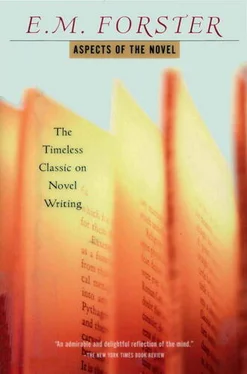One great advantage of flat characters is that they are easily recognized whenever they come in— recognized by the reader's emotional eye, not by the visual eye, which merely notes the recurrence of a proper name. In Russian novels, where they so seldom occur, they would be a decided help. It is a convenience for an author when he can strike with his full force at once, and flat characters are very useful to him, since they never need reintroducing, never run away, have not to be watched for development, and provide their own atmosphere—little luminous disks of a pre-arranged size, pushed hither and thither like counters across the void or between the stars; most satisfactory.
A second advantage is that they are easily remembered by the reader afterwards. They remain in his mind as unalterable for the reason that they were not changed by circumstances; they moved through circumstances, which gives them in retrospect a comforting quality, and preserves them when the book that produced them may decay. The Countess in Evan Harrington furnishes a good little example here. Let us compare our memories of her with our memories of Becky Sharp. We do not remember what the Countess did or what she passed through. What is clear is her figure and the formula that surrounds it, namely, "Proud as we are of dear papa, we must conceal his memory." All her rich humour proceeds from this. She is a flat character. Becky is round. She, too, is on the make, but she cannot be summed up in a single phrase, and we remember her in connection with the great scenes through which she passed and as modified by those scenes— that is to say, we do not remember her so easily because she waxes and wanes and has facets like a human being. All of us, even the sophisticated, yearn for permanence, and to the unsophisticated permanence is the chief excuse for a work of art. We all want books to endure, to be refuges, and their inhabitants to be always the same, and flat characters tend to justify themselves on this account.
All the same, critics who have their eyes fixed severely upon daily life—as were our eyes last week— have very little patience with such renderings of human nature. Queen Victoria, they argue, cannot be summed up in a single sentence, so what excuse remains for Mrs. Micawber? One of our foremost writers, Mr. Norman Douglas, is a critic of this type, and the passage from him which I will quote puts the case against flat characters in a forcible fashion. The passage occurs in an open letter to D. H. Lawrence, with whom he is quarrelling: a doughty pair of combatants, the hardness of whose hitting makes the rest of us feel like a lot of ladies up in a pavilion. He complains that Lawrence, in a biography, has falsified the picture by employing "the novelist's touch," and he goes on to define what this is:
It consists, I should say, in a failure to realize the complexities of the ordinary human mind; it selects for literary purposes two or three facets of a man or woman, generally the most spectacular, and therefore useful ingredients of their character and disregards all the others. Whatever fails to fit in with these specially chosen traits is eliminated—must be eliminated, for otherwise the description would not hold water. Such and such are the data: everything incompatible with those data has to go by the board. It follows that the novelist's touch argues, often logically, from a wrong premise: it takes what it likes and leaves the rest. The facets may be correct as far as they go but there are too few of them: what the author says may be true and yet by no means the truth That is the novelist's touch. It falsifies life.
Well, the novelist's touch as thus defined is, ol course, bad in biography, for no human being is simple. But in a novel it has its place: a novel that is at all complex often requires flat people as well as round, and the outcome of their collisions parallels life more accurately than Mr. Douglas implies. The case of Dickens is significant. Dickens' people are nearly all flat (Pip and David Copperfield attempt roundness, but so diffidently that they seem more like bubbles than solids). Nearly every one can be summed up in a sentence, and yet there is this wonderful feeling of human depth. Probably the immense vitality of Dickens causes his characters to vibrate a little, so that they borrow his life and appear to lead one of their own. It is a conjuring trick; at any moment we may look at Mr. Pickwick edgeways and find him no thicker than a gramophone record. But we never get the sideway view. Mr. Pickwick is far too adroit and well-trained. He always has the air of weighing something, and when he is put into the cupboard of the young ladies' school he seems as heavy as Falstaff in the buck-basket at Windsor. Part of the genius of Dickens is that he does use types and caricatures, people whom we recognize the instant they re-enter, and yet achieves effects that are not mechanical and a vision of humanity that is not shallow. Those who dislike Dickens have an excellent case. He ought to be bad. He is actually one of our big writers, and his immense success with types suggests that there may be more in flatness than the severer critics admit.
Or take H. G. Wells. With the possible exceptions of Kipps and the aunt in Tono Bungay, all Wells' characters are as flat as a photograph. But the photographs are agitated with such vigour that we forget their complexities lie on the surface and would disappear if it were scratched or curled up. A Wells character cannot indeed be summed up in a single phrase; he is tethered much more to observation, he does not create types. Nevertheless his people seldom pulsate by their own strength. It is the deft and powerful hands of their maker that shake them and trick the reader into a sense of depth. Good but imperfect novelists, like Wells and Dickens, are very clever at transmitting force. The part of their novel that is alive galvanizes the part that is not, and causes the characters to jump about and speak in a convincing way. They are quite different from the perfect novelist who touches all his material directly, who seems to pass the creative finger down every sentence and into every word. Richardson, Defoe, Jane Austen, are perfect in this particular way; their work may not be great but their hands are always upon it; there is not the tiny interval between the touching of the button and the sound of the bell which occurs in novels where the characters are not under direct control.
For we must admit that flat people are not in themselves as big achievements as round ones, and also that they are best when they are comic. A serious or tragic flat character is apt to be a bore. Each time he enters crying "Revenge!" or "My heart bleeds for humanity!" or whatever his formula is, our hearts sink. One of the romances of a popular contemporary writer is constructed round a Sussex farmer who says, "I'll plough up that bit of gorse." There is the farmer, there is the gorse; he says he'll plough it up, he does plough it up, but it is not like saying "I'll never desert Mr. Micawber," because we are so bored by his consistency that we do not care whether he succeeds with the gorse or fails. If his formula were analysed and connected up with the rest of the human outfit, we should not be bored any longer, the formula would cease to be the man and become an obsession in the man; that is to say he would have turned from a flat farmer into a round one. It is only round people who are fit to perform tragically for any length of time and can move us to any feelings except humour and appropriateness.
So now let us desert these two-dimensional people, and by way of transition to the round, let us go to Mansfield Park, and look at Lady Bertram, sitting on her sofa with pug. Pug is flat, like most animals in fiction. He is once represented as straying into a rose-bed in a cardboard kind of way, but that is all, and during most of the book his mistress seems to be cut out of the same simple material as her dog. Lady Bertram's formula is, "I am kindly, but must not be fatigued," and she functions out of it. But at the end there is a catastrophe. Her two daughters come to grief—to the worst grief known to Miss Austen's universe, far worse than the Napoleonic wars. Julia elopes; Maria, who is unhappily married, runs off with a lover. What is Lady Bertram's reaction? The sentence describing it is significant: "Lady Bertram did not think deeply, but, guided by Sir Thomas, she thought justly on all important points, and she saw therefore in all its enormity, what had happened, and neither endeavoured herself, nor required Fanny to advise her, to think little of guilt and infamy." These are strong words, and they used to worry me because I thought Jane Austen's moral sense was getting out of hand. She may, and of course does, deprecate guilt and infamy herself, and she duly causes all possible distress in the minds of Edmund and Fanny, but has she any right to agitate calm, consistent Lady Bertram? Is not it like giving pug three faces and setting him to guard the gates of Hell? Ought not her ladyship to remain on the sofa saying, "This is a dreadful and sadly exhausting business about Julia and Maria, but where is Fanny gone? I have dropped another stitch"?
Читать дальше












